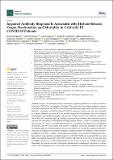Por favor, use este identificador para citar o enlazar a este item:
http://hdl.handle.net/10261/306295COMPARTIR / EXPORTAR:
 SHARE SHARE
 CORE
BASE CORE
BASE
|
|
| Visualizar otros formatos: MARC | Dublin Core | RDF | ORE | MODS | METS | DIDL | DATACITE | |

| Título: | Impaired antibody response is associated with histone-release, organ dysfunction and mortality in critically ill COVID-19 patients |
Autor: | Lagedal, Rickard; Eriksson, Oskar; Sörman, Anna; Huckriede, Joram; Kristensen, Bjarne; Franzén, Stephanie; Larsson, Anders; Bergqvist, Anders; Alving, Kjell; Forslund, Anders; Persson, Barbro; Ekdahl, Kristina N.; García de Frutos, Pablo CSIC ORCID ; Nilsson, Bo; Nicolaes, Gerry A. F.; Lipcsey, Miklos; Hultström, Michael; Frithiof, Robert | Palabras clave: | COVID-19 SARS-CoV-2 Critical care Antibody response NET Histones |
Fecha de publicación: | 14-jun-2022 | Editor: | Molecular Diversity Preservation International | Citación: | Journal of Clinical Medicine 11(12): 3419 (2022) | Resumen: | Purpose: the pathophysiologic mechanisms explaining differences in clinical outcomes following COVID-19 are not completely described. This study aims to investigate antibody responses in critically ill patients with COVID-19 in relation to inflammation, organ failure and 30-day survival. Methods: All patients with PCR-verified COVID-19 and gave consent, and who were admitted to a tertiary Intensive care unit (ICU) in Sweden during March¿September 2020 were included. Demography, repeated blood samples and measures of organ function were collected. Analyses of anti-SARS-CoV-2 antibodies (IgM, IgA and IgG) in plasma were performed and correlated to patient outcome and biomarkers of inflammation and organ failure. Results: A total of 115 patients (median age 62 years, 77% male) were included prospectively. All patients developed severe respiratory dysfunction, and 59% were treated with invasive ventilation. Thirty-day mortality was 22.6% for all included patients. Patients negative for any anti-SARS-CoV-2 antibody in plasma during ICU admission had higher 30-day mortality compared to patients positive for antibodies. Patients positive for IgM had more ICU-, ventilator-, renal replacement therapy- and vasoactive medication-free days. IgA antibody concentrations correlated negatively with both SAPS3 and maximal SOFA-score and IgM-levels correlated negatively with SAPS3. Patients with antibody levels below the detection limit had higher plasma levels of extracellular histones on day 1 and elevated levels of kidney and cardiac biomarkers, but showed no signs of increased inflammation, complement activation or cytokine release. After adjusting for age, positive IgM and IgG antibodies were still associated with increased 30-day survival, with odds ratio (OR) 7.1 (1.5¿34.4) and 4.2 (1.1¿15.7), respectively. Conclusion: In patients with severe COVID-19 requiring intensive care, a poor antibody response is associated with organ failure, systemic histone release and increased 30-day mortality. | Versión del editor: | http://dx.doi.org/10.3390/jcm11123419 | URI: | http://hdl.handle.net/10261/306295 | DOI: | 10.3390/jcm11123419 | Identificadores: | doi: 10.3390/jcm11123419 e-issn: 2077-0383 |
| Aparece en las colecciones: | (IIBB) Artículos (PTI Salud Global) Colección Especial COVID-19 |
Ficheros en este ítem:
| Fichero | Descripción | Tamaño | Formato | |
|---|---|---|---|---|
| Impaired Antibody Response Is AssociatedwithHistone-Release.pdf | 1,43 MB | Adobe PDF |  Visualizar/Abrir |
CORE Recommender
SCOPUSTM
Citations
1
checked on 17-may-2024
WEB OF SCIENCETM
Citations
1
checked on 28-feb-2024
Page view(s)
29
checked on 19-may-2024
Download(s)
17
checked on 19-may-2024
Google ScholarTM
Check
Altmetric
Altmetric
Este item está licenciado bajo una Licencia Creative Commons

